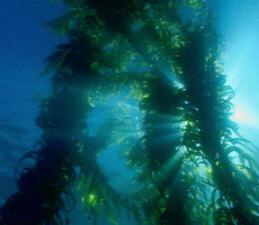|
|
|
|
|
THE OCEAN EDUCATION PROJECT
To Inform And Inspire
 The OEP's goals will be achieved through a collaborative campaign to bring the latest in scientific thinking and sustainable solutions to the forefront of our public policy debate. This will include a national public television special about marine reserves, the creation of an Empowerment Toolkit - an interactive web site and DVD to assist individuals in getting involved, and a suite of media-based teaching tools, supported by coordinated outreach efforts designed by print, radio and internet media participants, industry stakeholders and environmental, scientific, educational, and consumer and grassroots community organizations (see "Methods of Accomplishing Goals" below). The OEP's goals will be achieved through a collaborative campaign to bring the latest in scientific thinking and sustainable solutions to the forefront of our public policy debate. This will include a national public television special about marine reserves, the creation of an Empowerment Toolkit - an interactive web site and DVD to assist individuals in getting involved, and a suite of media-based teaching tools, supported by coordinated outreach efforts designed by print, radio and internet media participants, industry stakeholders and environmental, scientific, educational, and consumer and grassroots community organizations (see "Methods of Accomplishing Goals" below).
The overall scope of the project is being guided by the OEP Partners - individuals representing environmental, scientific, public and grassroots nonprofit organizations, and fisheries industry stakeholders (see "Project Participants" below). The OEP invites interested parties to submit proposals describing how they would implement grassroots education and outreach programs about MPAs in their area of expertise and interest, and potentially utilize the visual media created. This "bottom up" approach to outcomes and collaboration has a number of benefits over the traditional "top down" approach to structuring a project proposal.
Having outreach plans in place prior to funding will help insure donors of successful outcomes. Having each Outreach Collaborator design their own outreach program will insure that the methods employed are best suited to local or national constituencies and conditions. The OEP emphasizes collaboration, and leverage of people and assets. The goals are to raise public awareness, provide a basis for sound public policy decisions, and the education of the general public to inspire individual participation in solutions. We invite you all to join us.
STATEMENT OF VALUES & NEED
"Without the seas microbial plant and animal species to produce oxygen, absorb CO2, produce food, break down wastes, stabilize coastlines, and aerate sediments, life above the sea would be greatly different." (Pew Oceans Commission; Marine Reserves; 2003).
Simply put, for our oceans, it's now or never. The collapse of major fisheries worldwide and the rate of habitat loss has been so dramatic in the past 50 years that no one would have ever imagined it possible. The failure of the international community to create an effective regulatory framework to stem the tide continues to exacerbate problems. But some still ask, why all the concern about saving our oceans? The opening paragraphs of the Executive Summary of the U.S. Commission on Ocean Policy Report state it well:
"The oceans affect and sustain all life on Earth. They drive and moderate weather and climate, provide us with food, transportation corridors, recreational opportunities, pharmaceuticals and other natural products, and serve as a national security buffer. But human beings also influence the oceans. Pollution, depletion of fish and other living marine resources, habitat destruction and degradation, and the introduction of invasive nonnative species are just some of the ways people harm the oceans, with serious consequences for the entire planet.
 "The oceans provide tremendous value to our national economy. Annually, the nations ports handle more than $700 billion in goods, and the cruise industry and its passengers account for $11 billion in spending. The commercial fishing industrys total value exceeds $28 billion a year, the recreational saltwater fishing industry is valued at around $20 billion, and the annual U.S. retail trade of ornamental fish is worth another $3 billion. The offshore oil and gas industrys annual production is valued at $25 to $40 billion, and its yearly bonus bid and royalty payments contribute approximately $5 billion to the U.S. Treasury. "The oceans provide tremendous value to our national economy. Annually, the nations ports handle more than $700 billion in goods, and the cruise industry and its passengers account for $11 billion in spending. The commercial fishing industrys total value exceeds $28 billion a year, the recreational saltwater fishing industry is valued at around $20 billion, and the annual U.S. retail trade of ornamental fish is worth another $3 billion. The offshore oil and gas industrys annual production is valued at $25 to $40 billion, and its yearly bonus bid and royalty payments contribute approximately $5 billion to the U.S. Treasury.
"Every year, hundreds of millions of Americans and international visitors flock to the coasts to enjoy the oceans, spending billions of dollars and directly supporting more than a million and a half jobs. In fact, tourism and recreation constitute some of the fastest-growing business sectorsenriching economies and supporting jobs in communities virtually everywhere along the coasts of the continental United States, southeast Alaska, Hawaii, and our island territories and commonwealths. These concrete, quantifiable contributions to the national economy are just one measure of the oceans value. We also love the oceans for their beauty and majesty, and for their intrinsic power to relax, rejuvenate, and inspire. Unfortunately, we are starting to love our oceans to death."
But the economic benefits we receive from our oceans are dwarfed by the life-supporting role they play in our lives. It's even arguable that if our ocean ecosystems fail, life as we know it on this planet will fail with it. Clearly, there is a great deal at stake. Major legislation is now being introduced in Congress and in international governing bodies around the world. The time to act is right now, to raise public awareness and promote active participation.
|
|